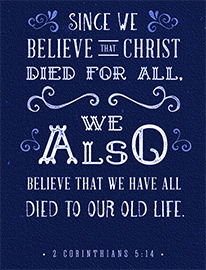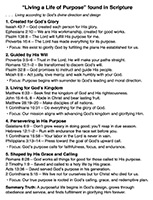Second Corinthians 5:11–6:2 . . .
Become Reconciled!
Have you ever wondered, What’s there to live for? That’s a question asked by Christians and non-Christians alike. These are times of crises. Last week’s study showed the importance of: (a) being courageous and walking by faith (5:6–8); (b) aiming to please God (v. 9); and (c) preparing for the judgment seat as we seek to please him (v. 10). Thankfully, a very helpful answer to What’s there to live for? is found in today’s passage, starting in v. 11 (shown at the bottom of page). Hopefully, you and many more will be helped by it.
Paul goes on to say that we’re to not only lead God-pleasing lives in our minds, but also to act faithfully. In effect, what Apostle Paul is saying here is, I find tremendous motivation from this awareness that all the hidden motives of my actions are going to come out in the open. He calls that “fear of the Lord.” Note: That so-called “fear” isn’t a trembling before God sensation but of respecting him; it’s about being aware that he’s a God of truth and that no one can water that down. Knowing this about God, Paul is pretty much saying, It motivates me to be honest and faithful in the work he has given me to do, that of persuading men.
Clearly, Paul’s primary concern in vv. 14–15 is that the love of Christ should be the motivating force behind believers’ lives, transforming their purpose and behavior. More than being faithful, honest, open, or properly motivated, Paul emphasizes a radical shift from self-centered living to living for Christ, who died and was raised for all believers. In addition, that he’ll use the opportunities he’s been given, living a resurrection life for others that’s motivated by love. And, he asserts that the love of Christ “compels” or “controls” him, meaning Christ’s sacrificial love on the cross fundamentally moves and governs everything he does.
Paul stresses us that we must be compelled by Christ’s love, which constrains, motivates, and then guides us after we get there; his wise words set the limits of what we should and shouldn’t do. That, Paul says, comes from the sense that Christ loves him dearly. He also says that he’s learned that Christ’s death freed him from the need to live for himself (v. 15).
To follow the Lord’s directive in v. 15 and live a purposeful life for him, Paul teaches that believers must shift from living for themselves to living for Christ, guided by his love; his sacrificial death transforms life’s goal; we’re called to serve, please, represent, and follow him in all we do. Instead of living for fleeting self-interests, we live purposely for him, making every action, relationship, and pursuit a way to reflect and honor Christ. Paul’s clear directive: Respond to Christ’s love by living not for yourself, but completely for him — a life with purpose, guided and shaped by the self-giving love of Jesus.
Verse 16 has two distinct parts: Part-a enables you to see people differently, making you treat them differently. Part-b should discourage you from continuing to treat people and God in worldly ways. In fact, there was a time, Paul appears to say, when we treated Christ that way. Everybody, even the most obscure, lowliest, and weakest among us, can become a child of God, made in his image, and is significant. That’s why Paul became freed from bias and prejudice, treating people accordingly. While he initially tried his best to exterminate the religion that thrived about him (probably because he mistakenly regarded Jesus as an impostor or a phony), now he’s saying, No more! Now we’ve learned to look at people differently. We see Christ for who he is — the Lord of Glory, God himself who became a man. Therefore, Paul tells us, We’re obligated to treat people differently, as he writes in v. 17.
If you are in Christ, you’re a new creation. He who’s begun a good work in you won’t fail to perform it until the day of Christ. So there’s always hope for every single one of us. Therefore, we’re to treat everybody differently because we no longer live for ourselves but for him who died and was raised again. What a privilege it will be for us to sit at the judgment seat of Christ (2 Cor. 5:1–10, reviewed last week), knowing that we stood firm for his name and loved him in the midst of the emptiness, death, and darkness of a dying world. Thank you, Lord, for gifting us believers with that privilege. Amen!
Apostle Paul painted a picture for us throughout chapter 5, drawing a portrait of a Christian, living in a dying world. Hopefully, we’ve already learned how a Christian ought to act in a world like ours today, which is comparable to the first-century world, filled with despair, hopelessness, corruption, deceit, and darkness. A Christian should strive to become someone in whose eyes there’s a great light of hope as he or she looks to the future, knowing that there’s substantial glory awaiting them for how they effectively deal with present trials and difficulties.
We’re to live like that, having that realization in our thoughts every day, being renewed in our minds by the Spirit of God so that we always look at life that way because that’s life. Having said all that, the apostle goes on to describe the ministry that God has given us (vv. 18–20). These remarkable words describe the greatest, most powerful, most effective work going on in the world today. Hopefully they describe accurately your “ministry of reconciliation.” Please read Paul’s words again, right now, here in vv. 18–20.
What exactly does Paul mean by “the ministry of reconciliation” (5:18)?
See how Got Questions Ministries answers this essential question here.
What a tremendous ministry to be given and used devotedly! We need to carefully understand this “ministry of reconciliation” because it’s our ministry; it’s what God has called each of us who knows, follows, and serves Jesus Christ to do. This isn’t Paul’s ministry or an apostle’s or even a pastor’ it’s our ministry. Notice how Paul uses the words “we” and “us” through this passage. He shared it with Christians of the early days in Corinth; and he shares it with us today. Our ministry of reconciliation: (a) comes to us from God himself (v. 18); (b) is a powerful ministry that reconciles the world (v. 19); (c) requires our voluntary acceptance of God’s invitation to us (v. 20); and (d) achieves the “righteousness of God” (shown in Paul’s magnificent v.21).
The final word in this week’s passage is addressed directly to the believers in Corinth, warning them to never “receive God’s grace in vein” (5:1). “Grace of God” is a general term that covers all that God has done for us in Christ. It means becoming reconciled to Father God. Paul is saying this to already reconciled people: Now, don’t let his grace be accepted in vain, empty, worthless ways in your life. When you receive Christ, the Spirit of Jesus comes in to live with you to do two basic things: (1) show you the difference between right and wrong and (2) give you the power to do what’s right and reject the wrong in every area of your life.
When would it be best for you to reach out to your neighbors, befriending them so that you’ll have an opportunity, hopefully, to share with them the change in your own life and heart? Hey! Now’s the very best time you’ve got! Take the time and make the effort! Paul completes his great “Become Reconciled!” message — of a beseeching God reaching out to a dying, despairing world with a cure for all its troubles — by pleading to us, seeing us as being actively involved in that process, always collaborating with him and God. And their joint appeal to us is this: Don’t wait. Become reconciled now.
Note: 2nd Corinthians encourages believers to embrace and follow the way of Jesus that transforms lives and values generosity, humility, and weakness. In chapters 1–3, Paul presents these four elements:
Treasure in fragile clay jars (ch. 4) | Old tent, new bodies (ch. 5)
God’s timely grace (ch. 6) | Godly sorrow, joyful reconciliation (ch. 7)
› Watch BibleProject’s superb animated video (2 minutes) that highlights Paul’s messages in these four chapters.
† Summary of 2 Corinthians 5:11–6:2
These twenty-three verses focus on the ministry of reconciliation and the new creation in Christ. Paul emphasizes several key points:
1) Paul and his co-workers are motivated by their reverence for God (“fear of the Lord”) to present and persuade others to appreciate the gospel.
2) Father God has restored friendly relations between the world and himself through Christ’s death and resurrection.
3) Those who are in Christ are a new creation; the old has gone, and the new has come.
4) Believers are given the ministry of reconciliation/restoration, acting as Christ’s ambassadors to share the message of reconciliation with others.
5) God made Christ, who had no sin, to represent and embody the sin for us, so that in Christ we might become the righteousness of God.
6) Paul urges the Corinthians not to receive God’s grace in vain while he also emphasizes that “now is the time of God’s favor, now is the day of salvation” (6:2).
This passage highlights (a) the transformative power of the gospel, (b) the importance of sharing this message with others, and (c) the urgency of responding to God’s offer of reconciliation.
- Q. 1 What does Paul mean by what he says about Christ and our response to him (vv. 15–17)?
- Q. 2 Because everyone can become a child of God, do you feel obligated to see and treat people differently?
- Q. 3 Reconciliation is the restoration of friendly relations. What story from your life illustrates reconciliation?
2 Corinthians 5:11–6:2
New International Version (NIV)
[You can view it in a different version by clicking here; you can also listen to chapter 5.]
The Ministry of Reconciliation
11Since, then, we know what it is to fear the Lord, we try to persuade others. What we are is plain to God, and I hope it is also plain to your conscience. 12We are not trying to commend ourselves to you again, but are giving you an opportunity to take pride in us, so that you can answer those who take pride in what is seen rather than in what is in the heart. 13If we are “out of our mind,” as some say, it is for God; if we are in our right mind, it is for you. 14For Christ’s love compels us, because we are convinced that one died for all, and therefore all died. 15And he died for all, that those who live should no longer live for themselves but for him who died for them and was raised again.
16So from now on we regard no one from a worldly point of view. Though we once regarded Christ in this way, we do so no longer. 17Therefore, if anyone is in Christ, the new creation has come: The old has gone, the new is here! 18All this is from God, who reconciled us to himself through Christ and gave us the ministry of reconciliation: 19that God was reconciling the world to himself in Christ, not counting people's sins against them. And he has committed to us the message of reconciliation. 20We are therefore Christ's ambassadors, as though God were making his appeal through us. We implore you on Christ's behalf: Be reconciled to God. 21God made him who had no sin to be sin for us, so that in him we might become the righteousness of God.
6 As God’s co-workers we urge you not to receive God’s grace in vain. 2For he says,
“In the time of my favor I heard you,
and in the day of salvation I helped you.”
I tell you, now is the time of God’s favor, now is the day of salvation.






